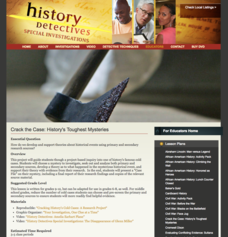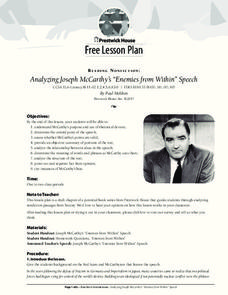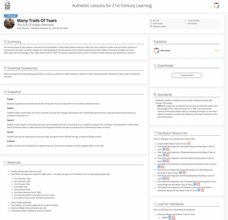Constitutional Rights Foundation
Ellis Island—The “Golden Door” to America
Are you one of the 100 million Americans whose ancestors passed through the doors of Ellis Island? Learn about the historic entry point for immigrants in the late 19th and early 20th centuries with an informative reading passage. After...
Curated OER
An Illustrated Guide to the Late 1800's
Eleventh graders investigate the time of the late 1800's. They conduct research using a variety of resources that could include the internet. Students create an alphabetized encyclopedia of important historical people of the time period.
Benjamin Franklin Tercentenary
Designing Benjamin Franklin: In Search of a Better World
How do you convey someone’s creativity? Individuals answer the question as they design exhibitions to showcase the intellect and genius of Benjamin Franklin. After conducting research, classmates work in groups to try to capture and...
The New York Times
Investigating the Heroin and Prescription Opioid Epidemic
How bad is the opioid crisis in America? Has it gotten worse in the last few decades? Why? High schoolers delve into these questions with a thorough and thoughtful lesson from The New York Times on heroin prescription opioids. Starting...
Curated OER
Lesson Plan: The Tour Starts at Noon
The Eleven-Headed Bodhisattva is a piece that represents characteristics, meanings, and ideals common to those who practice Buddhism in Japan. Learners fully analyze this piece, then take a virtual trip to examine the Buddhist temples...
Curated OER
Local Pride in a Guide
Learners examine the distinctive cultural and historical attributes of Boston and Philadelphia. They research the history, geography and culture of their town or city to create a booklet.
Curated OER
To Kill a Mockingbird: A Historical Perspective
Students research the Great Depression. In this Great Depression lesson, students analyze primary sources to develop an understanding of life in the American south during the depression era as they read Harper Lee's To Kill a...
University of Chicago
Comparing Modern and Ancient Ideas of Ethnicity and Identity
Explore ethnicity and identity with a research and writing assignment. Class members conduct online research, looking in particular at images and carefully noting down their sources on notecards. They read about identity and compose...
Facing History and Ourselves
Identity and Belonging
High schoolers examine World War I war crimes. For this world history activity, students examine a painting by Ashile Gorky, a refugee from the Armenian genocide. High schoolers interpret the piece of art and discuss its historical...
Curated OER
Everything was up to date in 1628
Learners view a video of Colonial House, a reality series where people lived according to the standards of European immigrants to the U.S. in 1628. In this colonial history instructional activity, students research changes in geographic...
Museum of Tolerance
Can It Happen in America?: Taking Social Action
Class members investigate the Jim Crow Laws, Executive Order 9066, the Chinese Exclusion Act, and the Indian Removal Act to gather information about not only the challenges encountered by diverse groups of Americans, but their...
National History Day
Challenging the Status Quo: Women in the World War I Military
Why are some so resistant to change? The status quo is often to blame for a lack of forward movement in society. Following the events of World War I, women in America suddenly had a voice—and were going to use it. Scholars use the second...
American Institute of Physics
African Americans and the Manhattan Project
A lesson plan about the Manhattan Project will explode young physicists' understanding of the racial attitudes in the United States during and after World war II. Groups select an African American scientist or technician that worked on...
American Institute of Physics
African Americans in Astronomy and Astrophysics
A two-part lesson focuses on the contributions to the fields of astronomy and astrophysics of two African Americans: Benjamin Banneker and Dr. George Carruthers. In part one, scholars learn about Benjamin Banneker by examining his...
PBS
Crack the Case: History's Toughest Mysteries
Young sleuths don their trench coats, tip their fedoras, and grab their notepads to investigate one of four famous unsolved mysteries. After examining multiple primary and secondary sources related to their cold case, they propose a...
Smithsonian Institution
We Have a Story to Tell: Native Peoples of the Chesapeake Region
How did colonial settlement and the establishment of the United States affect Native Americans in the Chesapeake region? Your young historians will analyze contemporary and historical maps, read informational texts, and work in groups to...
PBS
Civil War: Before the War
Free the slaves! Scholars research primary documents and videos while working together to create abolitionist posters. They examine the John Brown raid as a template to creating their own demonstration.
Prestwick House
Reading Nonfiction: Analyzing Joseph McCarthy's "Enemies from Within" Speech
Looking for a lesson plan that teaches class members how to analyze nonfiction? Use Joseph McCarthy's famous "Enemies from Within" speech as a instructional text. Worksheet questions direct readers' attention to the many historical...
Curated OER
What Is an "Inquiry Lesson"?
Students complete inquiry projects. In this historical perspectives lesson, students conduct their own research on topical historical questions their instructors suggest. Students then locate historical evidence and analyze it to learn...
West Virginia Department of Education
Editorials: The Guiding Voice of Authority?
How much can opinion influence a news story? A standalone resource discusses the importance of John Brown's Raid through the lens of journalism. Learners analyze two different texts, one from the perspective of the North and the other of...
K20 LEARN
Many Trails of Tears: The Era of Indian Removal
Cherokee, Chickasaw, Choctaw, Creek, and Seminole. All were forced off their ancestral lands in the southeastern United States as part of the Indian Removal Act of 1830. Young historians research the tribes' reactions to this removal and...
Curated OER
American Indian Reservation Controversies
Students interpret historical evidence presented in primary and secondary resources. For this American history lesson, students research the reservation controversies of the 1870's. Students use problem based learning...
Curated OER
Hindsight is 20-20Presidential First 100 DaysPresentation
Students interpret historical evidence presented in primary and secondary resources. For this American history lesson, students research the first 100 days of several American Presidents. Students use their research findings...
Curated OER
History of Street Names
Students consider how streets in their community were named. In this research skills lesson, students brainstorm the names of streets in their city or town and find out why they were named after certain individuals.

























